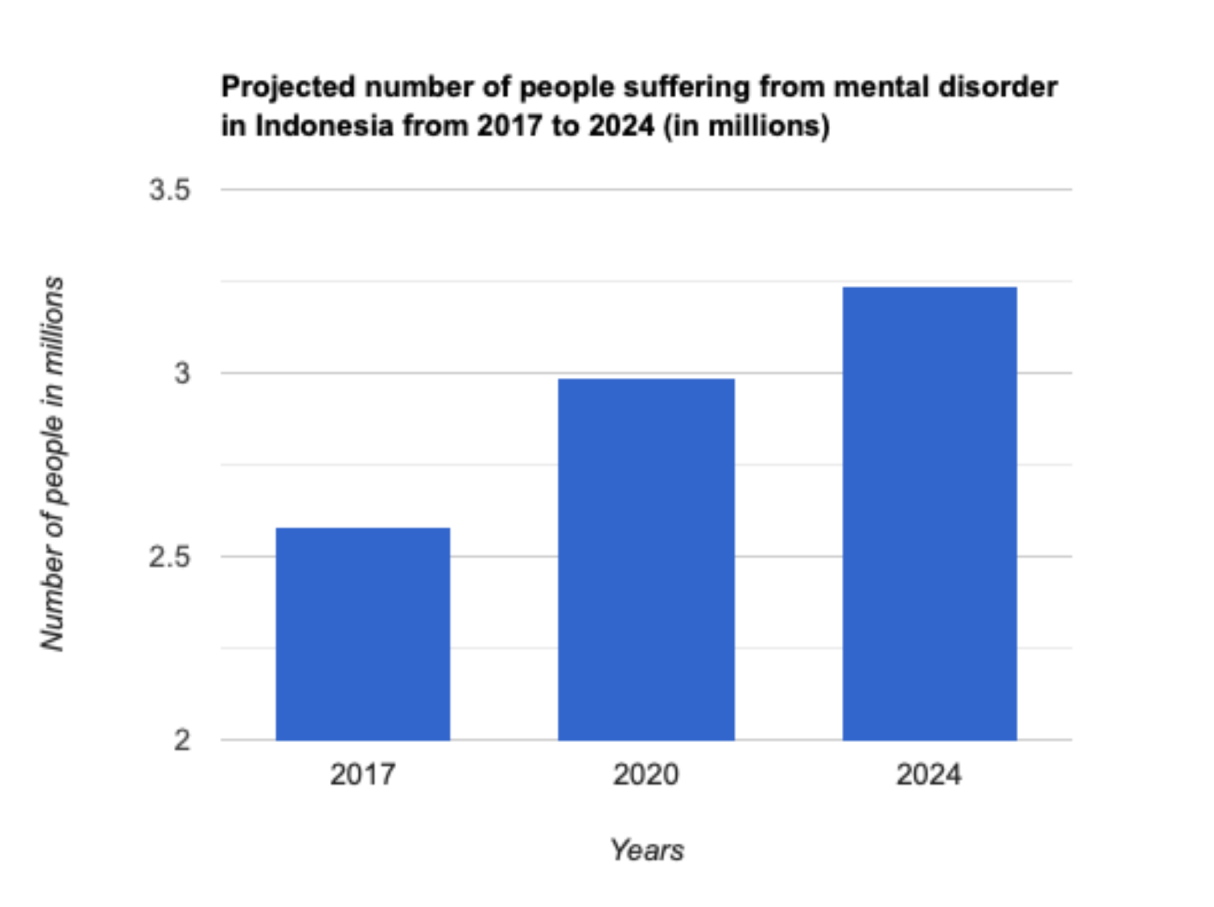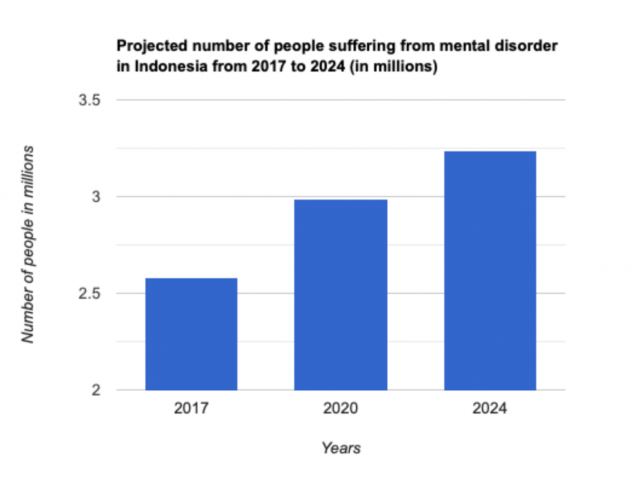Healing Through Speaking

How serious is mental health disorder?
People’s emotional, psychological, and social well-being are all the things that contribute to their mental health. It has a big impact on how people think, feel, and act. It also influences people’s ability to deal with stress, interact with people, and make good decisions. According to the Centers of Disease Control and Prevention (2023), mental health is a vital part of the stages people go through in their lives, from childhood through adulthood.
Mental health is just as important as physical health. Unfortunately in Indonesia, mental illness has become a very serious problem and people with severe mental disorders are highly stigmatized by society. This stigmatization negatively impacts the people who are suffering from the distressing condition and lowers the possibility of them seeking the professional help they truly need (Hartini, 2018).
The Indonesian mental health system is still considered underdeveloped. As stated in the Journal of Global Health Neurology and Psychiatry, the Indonesian mental health system is still considered inadequate and falls behind neighboring countries. This is due to the reality that there are inadequate government funding for mental health matters, an absence of availability of mental health professionals, and a big treatment gap in general (Cipta & Saputra , 2022).
As Indonesia’s mental health system fails to meet the needs and requirements to support people suffering from mental disorders and becomes a huge stigma for society, it leads to an increase in the number of people suffering from depression as the years go by. It is critical that people understand that depression is an illness, not a weakness. Furthermore, when these mental illnesses are not being treated right, it has a high possibility to worsen, have long-term consequences, and prevent a person from getting the most out of life (Behere, 2017).
Physical effects of depression include sleep loss and weight loss, however, not everyone is aware that when depression becomes severe, it has a possibility of hindering one’s ability to communicate effectively with the people around them. Mental Health Services (2019) states that for people with mental illnesses, speech becomes softer, monotonous, and labored, with more stops, starts, and pauses. Due to this, speaking up and sharing their feelings is not a particularly easy task to do. They lack any sort of community that supports the condition, which leads to these people not having a sense of belonging and acceptance anywhere in society.
Facts and figures about mental health disorders in Indonesia
As seen in Figure 1.0, throughout the years, the number of people suffering from mental disorders have gradually been increasing. Between the years of 2017 and 2020, the number of people suffering from mental disorders has increased by around 300,000 more. By 2024, the overall number of people suffering from mental disorders in Indonesia is estimated to be around 3.24 million (Wolff, 2022). Besides what is officially shown through the data, moreover, around 16.1 million teenagers have been classified as having mental health problems in their lives. The numbers are very high and concerning. To a certain extent, 0.4 percent of teens reported having tried suicide at some point in their lives (Arif, 2023).

Although there has been an attempt by governments to increase access to improvements in the health system, only 2.6% of adolescents suffering from mental health problems in Indonesia have access to these services or seek out the professional help they need (Salma, 2022). In addition to this, according to data from The Jakarta Post (2018), for Indonesia’s population of 260 million people, the number of psychiatrists that exist to potentially make a change is less than 1,000 people (Sebayang, Mawarpury & Rosemary, 2018). Through such a drastic increase in the number of people suffering from mental illness, with little commitment to alteration, it evidently shows how inadequate Indonesia’s mental health system has been in dealing with such matters, and that immediate changes should be taken seriously.
Destigmatizing the reality of mental illness and starting to build a safe and sound environment for this matter is the most significant first step for a change. Depression is a very serious condition that should be treated. In order to prevent and treat depression, giving those people an opportunity to be able to talk openly about their mental health will put a stop to stigmas
surrounding the matter and further encourage those who experience mental disorders to seek out for the help they should be getting. By building a safe community for them, it is a great opening, as the impact of allowing them to feel comfortable talking face to face with others can be a life changing experience and help for those suffering from mental disorders like depression. Furthermore, a safe and supportive community will help others to find bravery and come forward to openly and freely talk about their depression.
Healing through speaking
The ‘Healing through Speaking’ campaign significantly promotes the importance of encouraging people who suffer from depression to start sharing and talking about their feelings, without the fear of being judged by others. It raises awareness on the importance of building a supportive environment for a sense of belonging to those who suffer the unfortunate illness. The aim of this campaign is to let those who suffer know that “you are not alone”.
It’s one to remember that being a compassionate listener is much more powerful than being in an attempt to always be giving advice. The simple act of being listened to unveils extraordinary feelings of relief, relaxation and reassurance, especially during depression. Through a supportive community that listens compassionately, it will become a great tool for those suffering through depression to establish themselves in the community and change their lives upside down, and finally, for the better.
References
Arif, A. (2023, July 10). Mental health crisis haunting Indonesia’s generation Z. kompas.id. https://www.kompas.id/baca/english/2023/07/09/en-krisis-kesehatan-mental-menghantui- generasi-z-indonesia#:~:text=The%20latest%20survey%20from%20I,with%20mental%2 0disorders%20(ODGJ).
Behere, P. B., Kumar, K., & Behere, A. P. (2017, April). Depression: Why to talk?. The Indian journal of medical research.
https://www.ncbi.nlm.nih.gov/pmc/articles/PMC5663153/#:~:text=Hence%2C%20it%20i s%20very%20important,most%20out%20of%20one%27s%20life.
Centers for Disease Control and Prevention. (2023, April 25). About mental health. Centers for Disease Control and Prevention. https://www.cdc.gov/mentalhealth/learn/index.htm#:~:text=Mental%20health%20include s%20our%20emotional,childhood%20and%20adolescence%20through%20adulthood.
Cipta, D. A., & Saputra, A. (2022, August 5). Changing Landscape of Mental Health from early career psychiatrists’ perspective in Indonesia: Published in Journal of Global Health Neurology and Psychiatry. Journal of Global Health Neurology and Psychiatry. https://joghnp.scholasticahq.com/article/37413-changing-landscape-of-mental-health-fro m-early-career-psychiatrists-perspective-in-indonesia#:~:text=In%20today’s%20era,%20 despite%20some,falls%20behind%20its%20neighboring%20countries.
Hartini, N., Fardana, N. A., Ariana, A. D., & Wardana, N. D. (2021, November 16). Stigma toward people with mental health problems in Indonesia. Universitas Airlangga.
https://scholar.unair.ac.id/en/publications/stigma-toward-people-with-mental-health-probl ems-in-indonesia#:~:text=The%20prevalence%20of%20severe%20mental,is%20the%20 practice%20of%20pasung.
How should we talk to someone with depression?. Mental Health Services. (2019, April 18). https://www.stpatricks.ie/media-centre/blogs-articles/2019/april/how-should-we-talk-to-s omeone-with-depression
Salma. (2023, April 4). Burden of adolescent mental disorders in Indonesia: Results from Indonesia’s First National Mental Health Survey. Universitas Gadjah Mada. https://ugm.ac.id/en/news/23169-burden-of-adolescent-mental-disorders-in-indonesia-res ults-from-indonesia-s-first-national-mental-health-survey/#:~:text=I%2DNAMHS%20als o%20revealed%20that,in%20the%20past%2012%20months.
Wolff, C. N. (2022, March 31). Indonesia: Mental disorder projection 2017-2024. Statista. https://www.statista.com/statistics/1052647/indonesia-mental-disorder-projection/
Contributor: Shakilla Ramadhan, Communication student B2025
Editor: Lily El Ferawati

